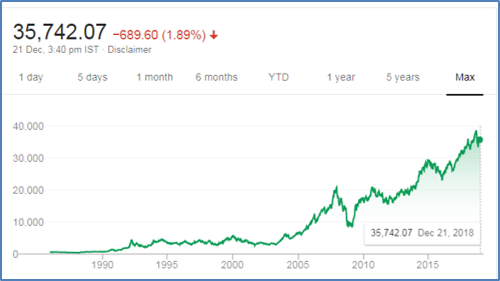This time, I have combined the key takeaways from 3 letters. Because, while Warren Buffet writes these letters with a gap of one year, we are trying to bring up these articles every month. So we need to avoid being repetitive. But, most of the knowledge imparted by him is so timeless and relevant, that we are forced to write about them again and again.
Berkshire Hathway Shareholder letter – 1980-82
Key learning from the letters (in no particular order)
Learning 1
Buy right and sit tight – If your purchase price is sensible, some long-term market recognition of the accumulation of retained earnings almost certainly will occur. If you are confident about your investment, you need to wait patiently. Pascal’s observation seems apt: “It has struck me that all men’s misfortunes spring from the single cause that they are unable to stay quietly in one room.” If there is ever a chart which can speak, I believe the below chart of BSE Sensex would just say “shut up and remain invested”.

Learning 2
Forecasting folly – Forecasts are useless especially in stock markets. Investors need to avoid falling for forecasts at any costs. “Forecasts”, said Sam Goldwyn, “are dangerous, particularly those about the future.” Read why here.
Learning 3
Invest when there is blood on street – Investors need to be patient and invest when there is fear in the market, because it is during these market corrections that you will get handsome opportunities.
Learning 4
Avoid business in industries producing un-differentiated products – Businesses in industries with both substantial over-capacity and a “commodity” product (undifferentiated in any customer-important way by factors such as performance, appearance, service support, etc.) are prime candidates for profit troubles. Investors need to be wary of businesses in industries where there is no difference in products like sugar, textile, paper etc.
PayPal founder, Peter Thiel in his ground breaking book “Zero to One” says “All failed companies are the same: they failed to escape competition.”, and it is very difficult to escape competition if the product you are producing is undifferentiated.
Learn more from Warren Buffet through previous parts of our series:


